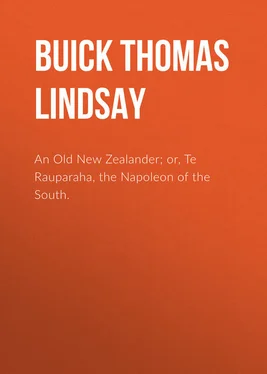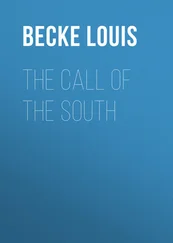Thomas Buick - An Old New Zealander; or, Te Rauparaha, the Napoleon of the South.
Здесь есть возможность читать онлайн «Thomas Buick - An Old New Zealander; or, Te Rauparaha, the Napoleon of the South.» — ознакомительный отрывок электронной книги совершенно бесплатно, а после прочтения отрывка купить полную версию. В некоторых случаях можно слушать аудио, скачать через торрент в формате fb2 и присутствует краткое содержание. Жанр: foreign_antique, foreign_prose, на английском языке. Описание произведения, (предисловие) а так же отзывы посетителей доступны на портале библиотеки ЛибКат.
- Название:An Old New Zealander; or, Te Rauparaha, the Napoleon of the South.
- Автор:
- Жанр:
- Год:неизвестен
- ISBN:нет данных
- Рейтинг книги:3 / 5. Голосов: 1
-
Избранное:Добавить в избранное
- Отзывы:
-
Ваша оценка:
- 60
- 1
- 2
- 3
- 4
- 5
An Old New Zealander; or, Te Rauparaha, the Napoleon of the South.: краткое содержание, описание и аннотация
Предлагаем к чтению аннотацию, описание, краткое содержание или предисловие (зависит от того, что написал сам автор книги «An Old New Zealander; or, Te Rauparaha, the Napoleon of the South.»). Если вы не нашли необходимую информацию о книге — напишите в комментариях, мы постараемся отыскать её.
An Old New Zealander; or, Te Rauparaha, the Napoleon of the South. — читать онлайн ознакомительный отрывок
Ниже представлен текст книги, разбитый по страницам. Система сохранения места последней прочитанной страницы, позволяет с удобством читать онлайн бесплатно книгу «An Old New Zealander; or, Te Rauparaha, the Napoleon of the South.», без необходимости каждый раз заново искать на чём Вы остановились. Поставьте закладку, и сможете в любой момент перейти на страницу, на которой закончили чтение.
Интервал:
Закладка:
T. Lindsay Buick
An Old New Zealander; or, Te Rauparaha, the Napoleon of the South
PREFACE
I have been constrained to write the story of "An Old New Zealander" largely to gratify the frequently expressed desire for a more comprehensive sketch of Te Rauparaha's career on the part of many readers of my former books, in which fitful glimpses of the old chief were given. These references have apparently awakened some considerable interest in the life and times of the great Ngatitoan, and although this period of New Zealand's history is by no means barren of literature, I am hopeful that there is still room for a volume in which much heterogeneous matter has been grouped and consolidated. There may be some amongst the reading public who will question the need, or the wisdom, of recording the savage and sanguinary past of the Maori; but history is always history, and if this contribution serves no other useful purpose, it may at least help to emphasise the marvellous transformation which has been worked in the natives of New Zealand since Te Rauparaha's time – a transformation which can be accounted one of the world's greatest triumphs for missionary enterprise. It may be, too, that some critics will not subscribe to my estimate of the chief's character, because it has been the conventional view that he who refused to part with his own and his people's heritage was destitute of a redeeming feature. Owing to the misrepresentation of the early settlers and traders he has been greatly misunderstood by their successors; and they have further added to the injustice by sometimes seeking to measure one who was steeped in heathen darkness by the holy standard which was raised by the Founder of Christianity. As in the careers of most conquerors, there is much in the life of Te Rauparaha that will not bear condonation; but in every British community there is a wholesome admiration for resourcefulness, indomitable will, and splendid courage; and, if the succeeding pages serve to balance these high qualities of the chief against his failings, they may assist in setting up a more equitable standard whereby future generations will be able to judge him.
In compiling this work I have necessarily had to draw upon many of the existing publications on New Zealand, and I now desire gratefully to acknowledge my obligations to their authors. I have also to thank Mr. S. Percy Smith, F.R.G.S., for the kindly interest he has displayed in the progress of my work, and in no less degree must I pay my respectful acknowledgments to Mr. H. M. Stowell and to Mr. J. R. Russell for their judicious criticisms and suggestions, whereby I have been assisted in arriving at a correct historical perspective. To Mr. T. W. Downes, of Whanganui, who has enthusiastically co-operated with me in procuring some of the illustrations, and to Mr. J. W. Joynt, M.A., for his careful revision of the proofs, I am equally indebted, and now beg to tender to these gentlemen my sincere thanks for their assistance.
Humbly acknowledging the force of Carlyle's dictum that "Histories are as perfect as the historian is wise and is gifted with an eye and a soul," I now present the result of my last year's labour to the reader.
THE AUTHOR.Victoria Avenue, Dannevirke, N.Z.,
May 23, 1911.
LAMENT ON THE CAPTURE OF TE RAUPARAHA
Alas! my heart is wild with grief:
There rises still
The frowning hill
Of Kapiti, in vain amid the waters lone!
But he, the chief,
The key of all the land, is gone!
Calm in the lofty ship, O ancient comrade, sleep,
And gaze upon the stillness of the deep!
Till now, till now,
A calm was but a signal unto thee
To rise in pride, and to the fray
Despatch some martial band in stern array!
But go thy way,
And with a favouring tide
Upon the billows ride,
Till Albion's cliffs thou climb, so far beyond the sea.
Thou stood'st alone, a kingliest forest tree,
Our pride, our boast,
Our shelter and defence to be.
But helplessly – ah, helplessly wast thou
Plucked sword-like from the heart of all thy host,
Thy thronging "Children of the Brave,"
With none to save!
Not amid glaring eyes;
Not amid battle cries,
When the desperate foes
Their dense ranks close:
Not from the lips of the terrible guns
Thy well-known cry resounding o'er the heath:
"Now, now, my sons!
Now fearless with me to the realms of Death!"
Not thus – not thus, amid the whirl of war,
Wert thou caught up and borne away afar!
Who will arise to save?
Who to the rescue comes?
Waikato's lord – Tauranga's chief,
Thy grandsons, rushing from their distant homes,
They shall avenge their sire – they shall assuage our grief.
While you, the "Children of the Brave,"
Still sleep a sleep as of the grave,
Dull as the slumbering fish that basks upon the summer wave.
Depart then, hoary chief! Thy fall —
The pledge forsooth of peace to all —
Of Heaven's peace, so grateful to their God above,
And to thy kinsmen twain, by whom
Was brought us from the portals of the "land of gloom,"
This novel law of love —
This law of good:
Say, rather, murderous law of blood,
That charges its own crimes upon its foes —
While I alone am held the source whence these disasters rose!
CHAPTER I
WHENCE AND WHITHER?
Probably no portion of the globe is so pregnant with the romance of unsolved problem as the Pacific Ocean. For thousands of years before Vasco de Balboa, the friend of Columbus, stood upon the heights of Panama and enriched mankind by his glorious geographical discovery, this great ocean and the islands which its blue waters encircle had remained a world in themselves, undisturbed by the rise and fall of continental kingdoms, unknown even to the semi-civilised peoples who dwelt on the neighbouring continental shores. But although thus shut out from human ken and wrapt in impenetrable mystery, we are entitled to presume that during all this period of time Nature, both animate and inanimate, had been there fulfilling its allotted part in the Creator's plan, though no pen has fully told, or ever can tell, of the many stupendous changes which were wrought in those far-away centuries either by the will of God or by the hand of man. That vast and far-reaching displacements had been effected before the Spanish adventurer's discovery of 1513 broke this prehistoric silence, there is little room to doubt, for the position and configuration of the island groups are as surely the results of geological revolutions as their occupation by a strangely simple and unlettered people is evidence of some great social upheaval in the older societies of the world. Precisely what those geological changes have been, or what the cause of that social upheaval, it would be imprudent to affirm, but there is always room for speculation, even in the realm of science and history, and there is no unreasonable scepticism in refusing to subscribe to the belief that the Pacific Ocean always has been, geographically speaking, what it is to-day, nor rash credulity in accepting the ruined buildings and monolithic remains which lie scattered from Easter Island to Ponape, as evidences of a people whose empire – if such it can be called – had vanished long before the appearance of the Spaniards in these waters.
But even if the opinion still awaits scientific verification that the islands and atolls which sustain the present population of the Pacific are but the surviving heights of a submerged continent, there is less room to doubt that the dark-skinned inhabitants of those islands can look back upon a long course of racial vicissitude antecedent to the arrival of the Spaniards. What the first and subsequent voyagers found was a people of stalwart frame, strong and lithe of limb, with head and features, and especially the fairness of the skin, suggestive of Caucasian origin. 1 1 "The distinguishing characteristic of the Marquesan Islanders, and that which at once strikes you, is the European cast of their features – a peculiarity seldom observable among other uncivilised peoples. Many of their faces present a profile classically beautiful, and I saw several who were in every respect models of beauty" ( Melville ).
Интервал:
Закладка:
Похожие книги на «An Old New Zealander; or, Te Rauparaha, the Napoleon of the South.»
Представляем Вашему вниманию похожие книги на «An Old New Zealander; or, Te Rauparaha, the Napoleon of the South.» списком для выбора. Мы отобрали схожую по названию и смыслу литературу в надежде предоставить читателям больше вариантов отыскать новые, интересные, ещё непрочитанные произведения.
Обсуждение, отзывы о книге «An Old New Zealander; or, Te Rauparaha, the Napoleon of the South.» и просто собственные мнения читателей. Оставьте ваши комментарии, напишите, что Вы думаете о произведении, его смысле или главных героях. Укажите что конкретно понравилось, а что нет, и почему Вы так считаете.











